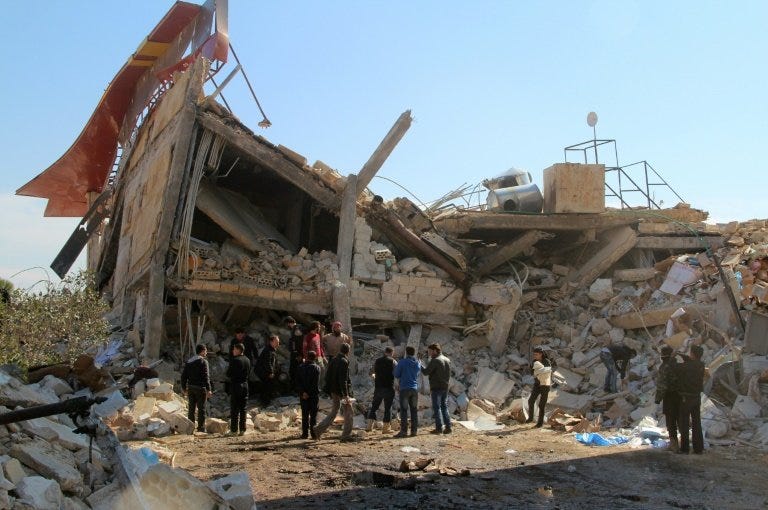
Agence France-Presse/Ghaith Omran
- Doctors Without Borders, one of the world's most important global relief agencies, employs more than 60,000 around the world, almost all of them locals.
- In an Insider investigation in collaboration with the public radio broadcase "Reveal" has found that when the group decides that conditions have become too dangerous, it evacuates international workers but leaves locals behind to fend for themselves.
- Doctors Without Borders says it can't fully protect all its workers, and has a "different level of responsibility" for those who leave their homes
- Visit Insider's homepage for more stories.
Doctors Without Borders is perhaps the most famous of all international relief organizations. Known internationally by its French acronym, MSF, it has been around for nearly 50 years and employs 63,000 people from around the world. Many MSF staffers leave behind comfortable lives to tend to the sick and wounded in some of the world's most difficult settings. It is hard not to be moved by the public perception that MSF has cultivated of dashing young physicians spurning well-paying jobs in global capitals to save lives in conflict zones. MSF's tenacity helped it earn a Nobel Peace Prize in 1999 and grow into a $2 billion-a-year behemoth today.
But an Insider investigation in collaboration with the nonprofit radio show and podcast "Reveal," based on interviews with about 100 current and former staffers in nearly 30 countries and a review of thousands of pages of documents, has found that a segregated, two-tiered workplace is firmly ingrained within MSF. While a small number of international workers wield disproportionate decision-making power and enjoy plush benefits, local workers say they often feel like second-class citizens, without access to the same quality medical care, pay, and security that their international counterparts enjoy. And dozens of current and former employees say that people of color, regardless of their position within the organization, are treated unequally.
When MSF decides that conditions on the ground at a particular site have become too dangerous, insiders said, the organization's standard practice is to evacuate visiting workers while leaving locals behind, often without warning. When MSF evacuated a project in Idlib province in northwestern Syria in 2013, several insider said, they kept the local staff in the dark about dangers they faced and moved the international staff to safety. Local staffers were left behind. "These guys lived in the same compound with us, they went to work with us, I worked side by side with the doctors, interpreters, nurses," said the former international staffer. "I never saw most of them again…. I mean, they could have been tortured by Assad."
Idlib was not an aberration: One international staffer who worked in Congo in 2017 said that after local authorities warned MSF about increased security risks in the area, she and another expat were instructed to abandon their project in the dead of night without telling their local colleagues, who woke up to find them gone. At a project in South Sudan in 2013, MSF evacuated local and national staff members after fighting broke out, only to return the local staffers back to the war zone the next day. "To me, that was a really big betrayal," a clinician who was sent back said. "That day, I felt that my life had been sold out."
Just this past August, as desperation gripped Afghanistan in advance of the chaotic withdrawal of US troops, current and former local MSF staffers across the country begged the organization for help getting out of the country. Their work for MSF, they said, made them targets for reprisals from both the Taliban and the Islamic State. "Anyone working for a foreign organization is in danger," one midwife who worked with MSF for five years said. Another, a lab technician, said a Taliban representative threatened to kill him for his association with MSF and the Red Cross, where he also worked.
Fearing for their safety, workers staged a protest in front of the MSF office in August holding signs saying "Our lives matter!" and "We are in danger!" The protesters met with MSF managers in Kabul, who declined to help them get out and assured them they would be safe. MSF has negotiated with the Taliban, the managers told the protesters, and continues to run five sites across the country even after the withdrawal of US troops.
Workers said the MSF representatives chided them for protesting, saying it could put them and their colleagues at risk - a response that seemed at odds with their assurances of safety. "I thought they said the Taliban weren't going to bother you," one nurse said. "We are all in danger. We worked for MSF, and now they won't do anything for us, claiming we are safe." The nurse added, "I'm sorry I worked for them."
In a statement in early September, an MSF representative said, "We are listening to their concerns and trying to identify what we might do to help them and support their individual choices," including providing information about possible avenues for emigration. "We have been clear that MSF is not able to provide visas, nor to provide evacuation." The representative added that while the group doesn't routinely evacuate locals, it does "look at individual cases and may support" extraction if a staffer's association with MSF puts them at risk.